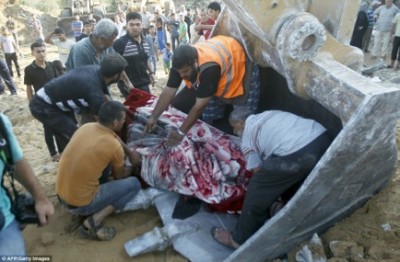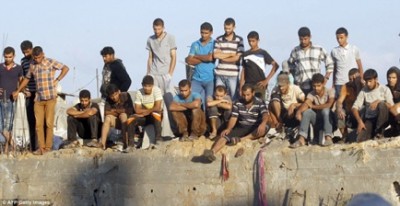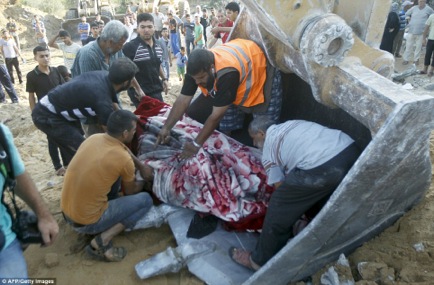
Eighteen members of the same family have reportedly been killed by Israeli tank shelling in Gaza moments before the start of a tense 12-hour ceasefire.
As the Palestinian death toll in the 19-day conflict reached 883, Gaza’s Health Ministry said the 18 relatives died in the southern Gaza Strip shortly before the truce took effect at 6am UK time. An Israeli military spokeswoman said she was checking the report.
Surviving members of the Al-Najar family, which the Health Ministry said had been trapped inside their house in Khuzaa village east of Khan Younis since Thursday, reportedly watched as rescue workers cleared the rubble of their home.
Today’s humanitarian ‘pause’ was agreed via the UN after U.S. Secretary of State John Kerry failed to secure a week-long halt in fighting.
A government source said Israel had rejected a week-long ceasefire, but Kerry said no formal proposals had yet been put forward.
Israel’s military said it would hold fire for 12 hours, but would press on with its search for tunnels used by militants. A spokesman for the Islamist group Hamas, which dominates Gaza, said all Palestinian factions would abide by the brief truce.
Hundreds of Palestinians poured into the streets in the minutes after the truce took force, some on foot to inspect damage to their homes, and many lined up outside banks to withdraw cash and stock up on supplies.
Gaza officials said five people were killed in Israeli air strikes overnight and militants fired a barrage of rockets out of Gaza, triggering sirens across much of southern and central Israel. No injuries were reported, with the Iron Dome interceptor system shooting down some of the projectiles.
Israel said that two more of its soldiers were killed in Gaza, bringing the army death toll to 37, as troops battled militants in the north, east and south of Gaza – a tiny Mediterranean enclave that is home to 1.8million Palestinians.
Three civilians have also been killed in Israel by rockets from Gaza – the kind of attack that surged last month amid Hamas’s anger at a crackdown on its activists in the West Bank, prompting the July 8 launch of the Israeli offensive.
It also announced that a soldier unaccounted for after an ambush in Gaza six days ago was definitely dead, although his body had not been recovered. Hamas said on Sunday it had captured the man but did not release a photograph of him.
Diplomats will pursue efforts to secure a ceasefire in Paris today, with France hosting officials from the United States, Britain, Germany, Italy, the European Union, Turkey and Qatar, a French diplomatic source said.
Mediators hope a truce could come into force ahead of a Muslim festival that starts early next week, but they have struggled to resolve seemingly irreconcilable demands from Israel and Hamas-led fighters, locked in conflict since July 8. And as diplomacy faltered, the fighting raged on.
Yesterday Israeli undercover police were involved in street conflicts with Palestinian protesters in Jerusalem as officers were put on high alert for flare-ups at the city’s most important mosque during Friday prayers for the final stretch of the Ramadan Muslim holy month.

Hundreds of Palestinians protested in the traditionally Arab east of the city after Muslim noon prayers today. A dozen protesters threw rocks and fireworks at Israeli police, who fired stun grenades and water cannons.
Israeli aircraft meanwhile have struck 30 houses in the Gaza Strip today, killing a leader of the militant Islamic Jihad group and two of his sons, as Palestinians called for a ‘Day of Rage’ following the clashes between at least 10,000 protesters and Israeli security forces late yesterday in the West Bank and in east Jerusalem.
Last night’s violence came after a UN school in Gaza, crowded with hundreds of Palestinians seeking refuge from fierce fighting, came under fire yesterday, killing at least 15 civilians and injuring more than 200.
Palestinian officials blamed Israel for the shelling of the school, which came on the deadliest day so far of the current round of fighting.
However, the Israeli military said the school ‘was not a target in any way’ and raised the possibility the compound was hit by Hamas rockets.
As further violence flared between Israelis and Palestinians in the West Bank and Jerusalem today, U.S. Secretary of State John Kerry pressed regional leaders to nail down a Gaza ceasefire.
Speaking in Cairo, Kerry told reporters that, although Israel may have rejected some language in a truce proposal draft, there “was no formal proposal, or final proposal, or proposal ready (for) a vote submitted to Israel”.
The top U.S. diplomat said there were still disagreements on the terminology, but he was confident there was a framework that would ultimately succeed and that “serious progress” had been made, although there was more work to do.
The search for a breakthrough will continue in Paris on Saturday when France hosts diplomats from the United States, Britain, Germany, Italy, the European Union, Turkey and Qatar, a French diplomatic source said.
‘We are working toward a brief seven days of peace. Seven days of a humanitarian ceasefire in honour of Eid in order to be able to bring people together to try to work to create a more durable, sustainable ceasefire for the long (term),” Kerry said.
U.N. Secretary-General Ban Ki-moon, speaking at the same news conference, threw his weight behind a seven-day humanitarian truce, saying it could start with an extendable 12-hour stoppage.
A 12-hour pause in Gaza hostilities will start at 7am Israeli time (0400 GMT) on Saturday, according to a U.S official. Israel has not commented on the report.
Hamas, which wants an end to an Israeli-Egyptian blockade of Gaza before agreeing to halt hostilities, has yet to respond to the ceasefire proposition, which has not been made public.
An Israeli source, who declined to be named, said Netanyahu’s security cabinet had turned down the plan because it did not let Israel carry on hunting down Hamas’s tunnel network that criss-crosses the Gaza border.
‘Kerry’s proposal leans (too much) towards Hamas’s demands,’ said the source.
As the diplomacy continued, so did the fighting. Gaza officials said Israeli strikes killed 33 people on Friday, including the head of media operations for Islamic Jihad and his son.
Militants fired a barrage of rockets out of Gaza, triggering sirens across much of southern and central Israel, including at the country’s main airport.
No injuries were reported, with the Iron Dome interceptor system knocking out many of the missiles.
The Gaza turmoil stoked tensions in the nearby West Bank. Medics said five Palestinians were killed in separate incidents near the cities of Nablus and Hebron, including one shooting that witnesses blamed on an apparent Jewish settler.
On Thursday night, 10,000 demonstrators marched in solidarity with Gaza near the Palestinian administrative capital Ramallah.
Protesters surged against an Israeli army checkpoint, throwing rocks and Molotov cocktails, and Palestinian medics said one was shot dead and 200 wounded when troops opened fire.
In Jerusalem, meanwhile, thousands of Israeli security forces were deployed for possible Palestinian protests after Friday prayers at a key Muslim holy site, said police spokeswoman Luba Samri.
Israel said an army reservist was killed in Gaza on Friday, bringing to 34 the number of soldiers lost in a ground advance it says aims to destroy dozens of cross-border tunnels used by Hamas to threaten its southern farming villages and army bases.
It also announced that a soldier unaccounted for after an ambush in Gaza six days ago was definitely dead, although his body had not been recovered. Hamas said on Sunday it had captured the man, but did not release a photograph of him.
Three civilians have also been killed in Israel by rockets from Gaza – the kind of attack that surged last month amid Hamas anger at a crackdown on its activists in the West Bank, prompting the July 8 launch of the Israeli offensive.
Israeli warplanes struck 30 houses earlier today throughout the Gaza Strip, including the home of Salah Hassanein, a leader of the military wing of Islamic Jihad, the second-largest militant group in Gaza after Hamas.
Hassanein and two of his sons were killed in the strike, said Gaza police spokesman Ayman Batniji and al-Kidra. The Israeli army confirmed the strike.
Over the past two weeks, Israeli aircraft have repeatedly hit homes of Hamas and Islamic Jihad leaders. Most had gone into hiding, but the strikes killed a leader of an Islamic Jihad rocket squad, a Hamas commander and a son of senior Hamas leader Khalil al-Haya, according to the Israeli military.
Such strikes have also claimed the lives of a large number of civilians. A Gaza human rights group said earlier this week that close to 500 homes have been damaged or destroyed in direct hits from the air, and that more than 320 people have been killed in their homes as a result of military strikes.
In the West Bank, protests against the Gaza operation operation erupted today in the northern village of Hawara, near the city of Nablus, and the southern village of Beit Omar, near the city of Hebron.
Palestinian hospital officials said three Palestinians were killed in Beit Omar and two in Hawara.
The mayor of Hawara, Mouin Idmeidi, said he and hundreds of others from the village participated in a protest after emerging from a local mosque following Friday noon prayers.
Hawara is located along a main north-south thoroughfare that is also used by Israeli motorists. Idmeidi said an Israeli motorist slowed down as he passed the march and fired at the group.
The mayor said four people were wounded and that one of them, a 19-year-old, died at Rafidiyeh Hospital in Nablus of his injuries.
After the shooting, clashes erupted between Palestinians and Israeli troops who opened fire, killing a 22-year-old from Hawara, the mayor said. Rafidiyeh hospital confirmed the deaths.
In Beit Omar, clashes erupted between Israeli forces and Palestinian stone-throwers. Hebron hospital officials said three Palestinians were killed. The Israeli military said it was looking into the reports.
Israeli Prime Minister Benjamin Netanyahu convened his security cabinet on Friday to discuss a limited humanitarian truce under which Palestinian movement would be freed up to allow in aid and for the dead and wounded to be recovered.
A Palestinian official close to the negotiations said Turkey and Qatar had proposed a 7-day halt to the fighting, which had been relayed to Israel by Kerry while Hamas considered it.
An Israeli official acknowledged that the proposal had been received, but said any decision by the Netanyahu government would likely come after Hamas had delivered its own response.
Israel insists that, even if such a ceasefire is agreed, its army will continue digging up tunnels along Gaza’s eastern frontier, a mission that could take between one and two weeks.
Netanyahu has said a truce should also lead to the eventual stripping of Gaza’s rocket arsenals – something Hamas rules out.
We must stop the rocket launches. How this is done – whether through occupying (Gaza), or broadening (the operation), or (international) guarantees, or anything else, I have to see it with my own eyes,’ said police minister Yitzhak Aharonovitch.
The rockets have sent Israelis regularly rushing to shelters and dented the economy despite Iron Dome’s high rate of success.
A Hamas rocket intercepted near Ben Gurion Airport on Tuesday prompted the U.S. Federal Aviation Administration (FAA) to halt American commercial flights to Israel’s main international gateway. Some European carriers followed suit.
Jolted by the blow at the height of an already stagnant summer tourism season, Israel persuaded U.S. authorities to lift the flight ban on Thursday, after which the European aviation regulator removed its own advisory against flying to Ben Gurion.
In the second such salvo in as many days, Hamas said it fired three rockets at the airport on Friday, an apparent bid to cripple operations there again. There was no word of impacts at Ben Gurion, whose passenger hall emptied at the sound of sirens.
Hamas leader Khaled Meshaal had on Wednesday voiced support for a humanitarian truce, but only if Israel eased restrictions on Gaza’s 1.8 million people.
Hamas wants Egypt to open up its border with Gaza, too, and demands that Israel release hundreds of prisoners rounded up in the West Bank last month following the kidnap and killing of three Jewish seminary students.
One Cairo official said next week’s Eid al-Fitr festival, which concludes Ramadan, was a possible date for a truce. But U.S. officials were circumspect on progress made by Kerry, whose mediation has involved Egypt, Turkey, Qatar and Abbas, as Washington, like Israel and the European Union, won’t deal directly with Hamas, which it considers a terrorist group.
Israel’s deputy foreign minister has today denied knowing who was responsible for the shelling of the UN-run school in Gaza, claiming the damage could have been caused by a Hamas rocket.
Tzachi Hanegbi said Israel regretted all deaths in the escalating conflict, but continued to lay the blame at the door of Hamas.
Speaking on the BBC Radio 4 Today programme, Mr Hanegbi said: ‘We have the knowledge about 2,000 rockets shot at us, most of them from the midst of Palestinian civilian concentrations.
‘Whilst we have to take precautions to defend ourselves, sometimes there are mistakes.
‘I don’t know who has caused this mistake – some say it is an Israeli mistake, maybe it was a Palestinian mistake, because, you know, every six rockets Hamas is shooting at us falls in Gaza, unfortunately for them.
‘I don’t have any knowledge about the specific bomb that fell. We are very sorry for each and everyone’s life paying the price for this tragedy.’
Kamel al-Kafarne, who was in the school, said people were boarding buses when three tank shells hit.
‘We were about to get out of the school, then they hit the school. They kept on shelling it,’ he said.
It was the fourth time a UN facility has been hit in Gaza fighting since the Israeli operation began on July 8.
UNRWA, the UN’s Palestinian refugee agency, has said it discovered dozens of Hamas rockets hidden inside two vacant schools.
But UN spokesman Farhan Haq said the school hit yesterday in the northern town of Beit Hanoun was not one of them.
The UN has also expressed alarm that rockets found in the schools have gone missing after they were turned over to local authorities in Gaza.
‘Those responsible are turning schools into potential military targets, and endangering the lives of innocent children,’ UN staff and anyone seeking shelter there, a UN statement said.
Fighting was fierce across Gaza yesterday, and at least 119 Palestinians were killed, making it the bloodiest day of the conflict so far.
Israel says the war is meant to halt the relentless rocket fire on its cities by Palestinian militants in Gaza and to destroy a sophisticated network of cross-border tunnels that Hamas is using to sneak into Israel to try to carry out attacks inside communities near the border.
Israel insists it does its utmost to prevent civilian casualties but says Hamas puts Palestinians in danger by hiding arms and fighters in civilian areas.
The attack on Beit Hanoun was likely to increase pressure on international diplomats shuttling around the region in an effort to broker a cease-fire.
More than 2,300 rockets have been fired at Israel from Gaza since July 8, and the Israeli military says it has uncovered 31 tunnels leading from Gaza to Israel, some of which have been used by Hamas to try to carry out attacks inside Israel.
Iranian protesters burnt Israeli and U.S. flags as rallies were held across the country today to show solidarity with Palestinians, urging them to keep up their struggle despite the Israeli assault on Gaza, it has been reported.
They carried banners reading ‘Defending Gaza and Palestine is our religious duty’.
‘We are ready to support our Palestinian brothers and sisters in Gaza. We are ready to sacrifice our blood for them,’ a man in his 40s told state television in the southern city of Zahedan.
People condemned U.S. support for Israel and burned U.S. and Israeli flags. State television said they also criticised foreign governments, who they said had remained silent about Israel’s ‘crimes against humanity’.
Ayatollah Ahmad Khatami told worshippers at Friday prayers at Tehran University that Muslims around the world should unite against Israel.
‘Pressure your governments to boycott this regime (Israel). All Muslims should join hands against this regime,’ he said.
Iran regards Palestine as comprising all of the Jewish state – which it does not recognise – as well as the West Bank and Gaza.
Israel and the United States have long accused Iran of supplying arms to Hamas, considered by Washington and the European Union as a terrorist group. Tehran says it gives moral, financial and humanitarian support.
However, Iran’s parliament speaker Ali Larijani said on Thursday that Tehran had provided Hamas with ‘the technology to manufacture arms’.
‘There was a time that Hamas needed the know-how… We gave it to them and today the fighters in Gaza are capable of meeting their needs,’ Larijani told Iran’s Arabic language al-Alam TV.
Daily Mail


Leave a Reply
You must be logged in to post a comment.